单选题-届高考英语常考英文谚语集锦及练习
高考英语俚语与俗语练习题30题(带答案)
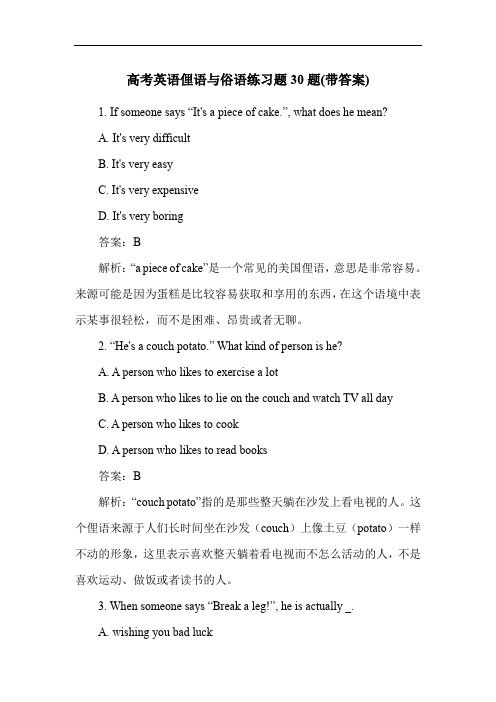
高考英语俚语与俗语练习题30题(带答案)1. If someone says “It's a piece of cake.”, what does he mean?A. It's very difficultB. It's very easyC. It's very expensiveD. It's very boring答案:B解析:“a piece of cake”是一个常见的美国俚语,意思是非常容易。
来源可能是因为蛋糕是比较容易获取和享用的东西,在这个语境中表示某事很轻松,而不是困难、昂贵或者无聊。
2. “He's a couch potato.” What kind of person is he?A. A person who likes to exercise a lotB. A person who likes to lie on the couch and watch TV all dayC. A person who likes to cookD. A person who likes to read books答案:B解析:“couch potato”指的是那些整天躺在沙发上看电视的人。
这个俚语来源于人们长时间坐在沙发(couch)上像土豆(potato)一样不动的形象,这里表示喜欢整天躺着看电视而不怎么活动的人,不是喜欢运动、做饭或者读书的人。
3. When someone says “Break a leg!”, he is actually _.A. wishing you bad luckB. asking you to break your legC. wishing you good luckD. making fun of you答案:C解析:“Break a leg!”是美国英语中的一个俚语,虽然字面意思是摔断腿,但实际上是在祝愿对方好运。
高中英语英语俗语用法单选50题(含答案)
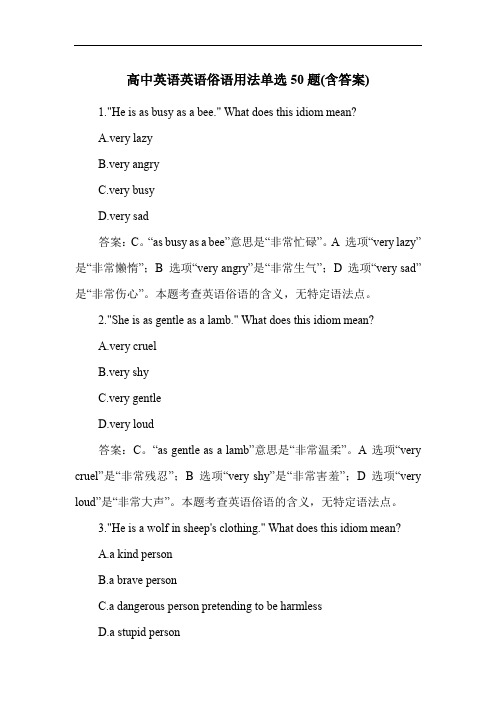
高中英语英语俗语用法单选50题(含答案)1."He is as busy as a bee." What does this idiom mean?A.very lazyB.very angryC.very busyD.very sad答案:C。
“as busy as a bee”意思是“非常忙碌”。
A 选项“very lazy”是“非常懒惰”;B 选项“very angry”是“非常生气”;D 选项“very sad”是“非常伤心”。
本题考查英语俗语的含义,无特定语法点。
2."She is as gentle as a lamb." What does this idiom mean?A.very cruelB.very shyC.very gentleD.very loud答案:C。
“as gentle as a lamb”意思是“非常温柔”。
A 选项“very cruel”是“非常残忍”;B 选项“very shy”是“非常害羞”;D 选项“very loud”是“非常大声”。
本题考查英语俗语的含义,无特定语法点。
3."He is a wolf in sheep's clothing." What does this idiom mean?A.a kind personB.a brave personC.a dangerous person pretending to be harmlessD.a stupid person答案:C。
“a wolf in sheep's clothing”意思是“披着羊皮的狼”,即一个危险的人假装无害。
A 选项“a kind person”是“一个善良的人”;B 选项“a brave person”是“一个勇敢的人”;D 选项“a stupid person”是“一个愚蠢的人”。
本题考查英语俗语的含义,无特定语法点。
高考俚语俗语单选30题

高考俚语俗语单选30题1. Tom said he was “on fire” today. What does “on fire” mean in this context?A. angryB. very hotC. extremely successful or performing very wellD. on the verge of a breakdown答案:C。
“on fire”在俚语中通常表示“极其成功或表现非常好”。
选项A“angry”是生气;选项B“very hot”是非常热;选项D“on the verge of a breakdown”是处于崩溃的边缘。
在这个语境中,Tom 说自己今天“on fire”,结合文化背景,这个短语常用来形容人状态极佳,表现出色。
2. When Mary said she was “down to earth”, what does it imply?A. humble and practicalB. living on the ground floorC. feeling sad and depressedD. being interested in gardening答案:A。
“down to earth”意思是“谦逊务实的”。
选项B“living on the ground floor”是住在一楼;选项C“feeling sad and depressed”是感到悲伤和沮丧;选项D“being interested in gardening”是对园艺感兴趣。
这个短语在文化中常用来形容人不浮夸,脚踏实地。
3. “He is a big cheese.” What does this sentence mean?A. He is a large piece of cheese.B. He is an important person.C. He is good at making cheese.D. He is fond of eating cheese.答案:B。
高中英语谚语练习题50题答案解析版
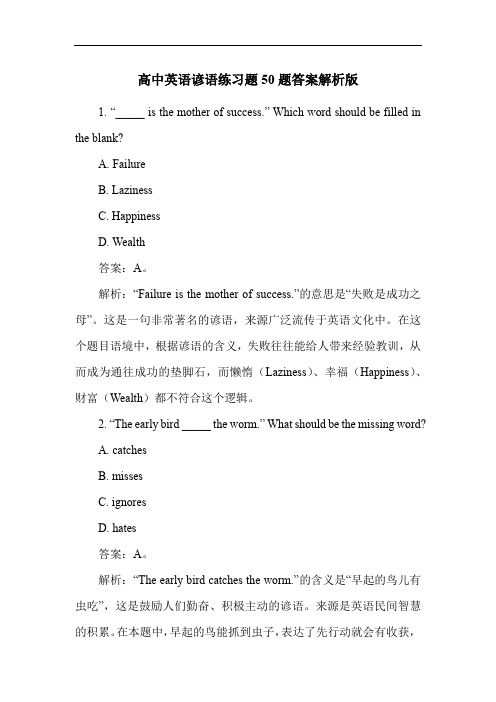
高中英语谚语练习题50题答案解析版1. “_____ is the mother of success.” Which word should be filled in the blank?A. FailureB. LazinessC. HappinessD. Wealth答案:A。
解析:“Failure is the mother of success.”的意思是“失败是成功之母”。
这是一句非常著名的谚语,来源广泛流传于英语文化中。
在这个题目语境中,根据谚语的含义,失败往往能给人带来经验教训,从而成为通往成功的垫脚石,而懒惰(Laziness)、幸福(Happiness)、财富(Wealth)都不符合这个逻辑。
2. “The early bird _____ the worm.” What should be the missing word?A. catchesB. missesC. ignoresD. hates答案:A。
解析:“The early bird catches the worm.”的含义是“早起的鸟儿有虫吃”,这是鼓励人们勤奋、积极主动的谚语。
来源是英语民间智慧的积累。
在本题中,早起的鸟能抓到虫子,表达了先行动就会有收获,错过(misses)、忽视(ignores)、讨厌(hates)都不符合谚语意义。
3. “No pains, no _____.” Which is the correct word?A. gainsB. lossesC. shamesD. blames答案:A。
解析:“No pains, no gains.”意思是“没有付出就没有收获”。
这是被广泛认可的励志谚语,反映了努力和回报之间的关系,是英语文化中激励人们勤奋努力的话语。
在本题语境中,没有痛苦((努力)就没有收获,损失((losses)、羞耻((shames)、责备((blames)都与谚语意义不符。
高中英语谚语情景交际单选题汇编及答案
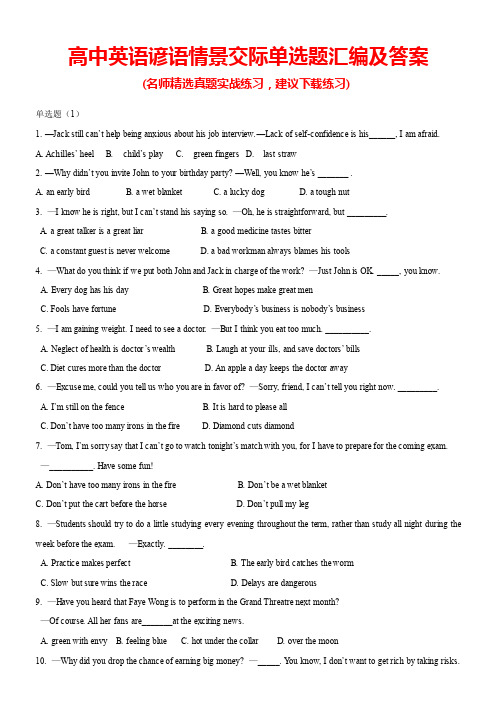
高中英语谚语情景交际单选题汇编及答案(名师精选真题实战练习,建议下载练习)单选题(1)1. —Jack still can‘t help being anxious about his job interview.—Lack of self-confidence is his______, I am afraid.A. Achilles‘ heelB. child‘s playC. green fingersD. last straw2. —Why didn‘t you invite Jo hn to your birthday party? —Well, you know he‘s _______ .A. an early birdB. a wet blanketC. a lucky dogD. a tough nut3. —I know he is right, but I can‘t stand his saying so. —Oh, he is straightforward, but _________.A. a great talker is a great liarB. a good medicine tastes bitterC. a constant guest is never welcomeD. a bad workman always blames his tools4. —What do you think if we put both John and Jack in charge of the work? —Just John is OK. _____, you know.A. Every dog has his dayB. Great hopes make great menC. Fools have fortuneD. Everybody‘s business is nobody‘s business5. —I am gaining weight. I need to see a doctor. —But I think you eat too much. __________.A. Neglect of health is doctor‘s wealthB. Laugh at your ills, and save doctors‘ billsC. Diet cures more than the doctorD. An apple a day keeps the doctor away6. —Excuse me, could you tell us who you are in favor of? —Sorry, friend, I can‘t tell you right now. _________.A. I‘m still on the fenceB. It is hard to please allC. Don‘t have too many irons in the fireD. Diamond cuts diamond7. —Tom, I‘m sorry say that I can‘t go to watch tonight‘s match with you, for I have to prepare for the coming exam. —__________. Have some fun!A. Don‘t have too many irons in the fireB. Don‘t be a wet blanketC. Don‘t put the cart before the horseD. Don‘t pull my leg8. —Students should try to do a little studying every evening throughout the term, rather than study all night during the week before the exam. —Exactly. ________.A. Practice makes perfectB. The early bird catches the wormC. Slow but sure wins the raceD. Delays are dangerous9. —Have you heard that Faye Wong is to perform in the Grand Threatre next month?—Of course. All her fans are_______at the exciting news.A. green with envyB. feeling blueC. hot under the collarD. over the moon10. —Why did you drop the chance of earning big money? —_____. Y ou know, I don‘t want to get rich by taking risks.A. All is well that eats wellB. One man‘s meat is another‘s poisonC. Better safe than sorryD. No sweet w ithout sweat11. —Time flies! The wonderful party is over. We‘ll have to part. —No need to feel blue. ______.A. A still tongue makes a wise headB. A single flower does not make a springC. All that glitters is not goldD. All good things come to an end12. —Why, I‘ve told Joe millions of times to leave his dirty shoes outside. —Come on, calm down. _____, you know.A. Old habits die hardB. Bad news travels fastC. A word to the wise is enoughD. A miss is as good as a mile13. —It is reported in the newspaper that the murderer was caught in a small town. —________.A. Lies have short legsB. Justice has long armsC. One false move may lose the gameD. Kings go mad, and the people suffer for it.14. —I regret that I spent three hours chatting about nothing with my friends at the party when I should have been preparing for the coming exam. —Learn to control yourself. __________.A. Friends are thieves of timeB. Friends agree best at distanceC. Friends must partD. A friend is never known till a man has need15. —Mr. Wang is a man of few words, but quick in mind. —_______, you know.A. A single flower does not make a springB. A great talker is a great liarC. A still tongue makes a wise headD. A man of words and not of deeds is like a garden full of weeds16—It shouldn‘t take long to clear up after the party if we all volunteer to help. —That‘s right _______.A. The sooner begun, the sooner doneB. Something is better than nothingC. The more the merrierD. Many hands make light work17. —I got sick and tired of hotels and hotel food after the trip to Mexico. — I can imagine. ___________.A. Don‘t meet trouble half-way.B. All‘s well that ends well.C. East or west, home is the best.D. Honesty is the best policy.18. — Learning a language isn't easy. It takes time.—I agree. _______. There's no short cut.A. All roads lead to RomeB. Rome wasn't built in a dayC. Practice makes perfectD. Slow but sure wins the race19. I had trouble telling Pedro he‘d lost his job. I started _____and talking about one door closing and another door opening.A. beating a dead horseB. adding fuel to the fireC. beating around the bushD. opening Pandora‘s box20. Many thought that after starring in the immensely popular drama, Nirvana in Fire, Hu Ge would____ and actively seek new roles.A. make a mountain out of a molehill.B. have too many irons in the fire.C. strike while the iron is hotD. put the cart before the horse21. —I have tried very hard to find a solution to the problem, but in vain.—Why not consult with Frank? Y ou see, __________.A. two heads are better than oneB. a bird in the hand is worth two in the bushC. great minds thinks alikeD. it‘s better to think twice before doing something单选题(2)1. —I‘d rather have some wine, if you don‘t mind. —_______. Don‘t forget that you‘ll drive.A. Anything but thatB. By all meansC. Take it easyD. I wouldn‘t say no to this2. ---I‘m thinking of going back to school to get another degree.---Sounds great!_____.A. It all dependsB. Go for itC. Never mindD. No wonder3. — Why do you always lie to our mother you love her cooking?—It‘s only a white lie, so __________.A. my pleasureB. don‘t mention itC. don‘t botherD. it‘s no big deal4.----This is your order, a hamburger and an apple pie. __________?A. Anything elseB. Is that OKC. For here or to goD. Something to drink5. --- I‗m afraid we should book tickets for the film in advance. --- _______. Y ou know, it has won five Oscar awards.A. That‗s how I see itB. It‗s all rightC. I hope it goes well for youD. Y ou can do it.6 —I think what makes a girl shine is not her looks but her personality. —_______.A. Y ou have a pointB. It serves you rightC. Not likelyD. Don‘t mention it7.—May I use your new dictionary? I want to look up a word. ____. —It's over there.A. Feel freeB. Got itC. It dependsD. It's my pleasure8---Thanks a lot for your book. I found it very interesting.---- _______. I‘m glad you enjoyed it.A. All the bestB. It is nothingC. No thanksD. V ery well.9. ---What do you think of the house?---________. It‘s everything we‘ve been looking for.A. Perfect!B. Good idea!C. Not bad.D. so-so.10 . ---I‘m afraid you have the wrong number. --- Sorry! ________.A. See you laterB. I didn‘t know thatC. Hold on, pleaseD. I hope I didn‘t bother you11. — How far can you run without stoppin g?—________. I‘ve never tried.A. Don‘t mention itB. That‘s all rightC. I have no ideaD. Go ahead12. —This is a really lively party. There‘s a great atmosphere, isn‘t there?— ________ The hosts know how to host a party.A. Don't worryB. Y es, indeedC. No, there‘s isn‘tD. It all depends13 --I‘m tired. I‘m taking next week off.--__________, honey. Y ou do need a break.A. Not so sureB. Forget itC. Great ideaD. No way14. –Shall we go for a drink at one o‘clock this afternoon? --___________. Will two o‘clock be OK?A. Sure, it‘s up to youB. Sure, no problemC. Sorry, I can‘t make itD. Sorry, I‘m not available today15. --I feel so nervous about the National English Speech Competition tomorrow. --________.A. I really envy youB. Glad to hear thatC. Sounds greatD. Take it easy16. ---- I‘m going to V enice next week. ---- _________. Carnival will be held then. Have fun!A. Y ou‘re crazyB. Y ou‘r e luckyC. Y ou‘d better notD. Y ou never know17. ----Mary‘s been offered a job in a university, but she doesn‘t want to take it. ----______? It‘s a very good chance.A. Guess whatB. So whatC. Who caresD. How why18. —What about 100 yuan? That‘s my final offer.—_______ I sell it to you just at the cost price this time for your future visit to my shop.A. Y ou win.B. What for?C. No comment.D. Out of the question19.--- Forgotten something? I can keep an eye on your kids if you want to go and get it. ----____.Thank you all the same.A. It's very kind of you.B. Oh, how careless of me!C.I might u well go and get it.D. Well, I can do without it20.---- Hey, can I ask you a favor? ---- Sure, _________ .A. here you areB. just as I thoughtC. how is it goingD. what can I do for you?21.---- Excuse me, but could I trouble you for some change?---- _______. Will pennies do?A. I knowB. Never mindC. I am sureD. Let me see22 —Reading is the best way to pass time on the train.—________. I never go travelling without a book.A. Y ou are jokingB. That's trueC. I don't think soD. It sounds like fun23—I get at least half an hour of exercise almost every day.—Oh great! ________.A. Good luckB. Cheer upC. Same to youD. Keep it up24—I'm sorry for breaking the cup.—Oh, ________—I've got plenty.A. forget itB. my pleasureC. help yourselfD. pardon me25—I can't remember those grammar rules!—________. Practise more.A. Y ou're not aloneB. It's hard to sayC. I'm afraid notD. It's up to you26—________!Somebody has left the lab door open.—Don't look at me.A. Dear meB. Hi, thereC. Thank goodnessD. Come on27 —Could I use this dictionary?—________. It's a spare one.A. Good ideaB. Just go aheadC. Y ou're welcomeD. Y ou'd better not28 —This apple pie is too sweet, don't you think so? —________. I think it's just right, actually.A. Not reallyB. I hope soC. Sounds goodD. No wonder29—Is Anne coming tomorrow? —________. If she were to come, she would have called me.A. Go aheadB. CertainlyC. That's rightD. I don't think so 30—I got that job I wanted at the public library.—________!That's good news.A. Go aheadB. CheersC. CongratulationsD. Come on 31—Y ou know, I met my girlfriend's parents for the first time only yesterday.—________?I thought you'd met them before.A. So whatB. PardonC. ReallyD. What for32 —How about dinner tonight? It's on me.—________.A. Y ou are welcomeB. Oh, I'd like toC. Well, I'm afraid soD. That's all right 33—OK, I'll fix your computer right now. —Oh, take your time. ________.A. I can't stand itB. I'm in no hurryC. That's a great ideaD. It's not my cup of tea 34—How long have you been learning English? —About four months.—________!Y our English is so good.A. Y ou can't be seriousB. Y ou got itC. I couldn't agree moreD. I'm stuck35 —I am going to Spain for a holiday soon.—________.A. It's my pleasureB. Never mindC. Leave it aloneD. Good for you36 —I'd like a wake-up call at 7:00 am, please!—OK,________.A. help yourselfB. you'll certainly make itC. just do what you likeD. I'll make sure you get one 37—Why not stay here a little longer?—________,but I really have to go.A. Never mindB. I'd love toC. Pleased to meet youD. I can't find any reason38 —Jack, I'd like to have your opinions about my written report.—________. But I have one suggestion.A. That's a good ideaB. Y ou are too modestC.It looks fine to meD. Y ou should check it first 39—Jim, can you work this Sunday?—________? I‘ve been working for two weeks on end.A. Why meB. Why notC. What ifD. So what40. —Mum, look at my shoes. I need a new pair. — ______ I bought them for you only a week ago!A. Y ou betB. Y ou said itC. Y ou don't sayD. Y ou name it41—Sorry, Liz. I think I was a bit rude to you. —______, but don‘t do that again!A. Go aheadB. Forget itC. It dependsD. With pleasure 42—Jack, you seem excited. —______? I won the first prizeA. Guess whatB. So whatC. Pardon meD. Who cares43— Hi, John. Are you busy?—______A. Yes. I do agreeB. Y es. That would be nice.C. No. Are you sure?D. No. What‘s up?44— Why don't you consider a trip to, say, Beijing or Hangzhou? —______.A. I wouldn't mind thatB. Then we'll get there quicklyC. Let's call it a dayD. It's not a requirement 45—Do you mind if I open the window?—No, ______.A. look outB. forget itC. go aheadD. take it easy46. —Mum, my coach says I‘m doing well in the training.—______? Y ou still have a long way to go.A. Why notB. So whatC. How soD. Where to47. --Where do you think Simon‘s disappeared to?-- ___________. But we are trying to get in t ouch with his parents.A. God bless youB. It‘s no big dealC. God knowsD. It makes sense48.---How far is it from the mountain top, Dad? I am really tired out. ---________, dear! We are reaching it.A. That's all rightB. My goodnessC. Come onD. No wonder49---I don‘t understand why I have been dismissed.---________! Y ou are always being late and making mistakes.A. Y ou are asking for it.B. Y ou are kiddingC. It‘s up to youD. Y ou‘ve got a point there50一Jane looked beautiful at the wedding.一Huh! Too much make-up _________.A. as I must disagree‘B. when I dare sayC. unless you mindD. if you ask me51 --Kim, give me your report by 10 am. --______ have you been in charge of this project?A. Since whenB. By whomC. For whatD. From where52 —Do you understand the film The Hobbit, the most amazing US-made one last year?—______, but I am confused at many scenes.A. Not a littleB. Not a bitC. Just a bitD. No problem53. —I would appreciate it if you could forgive Lucy and be friendly to her as you used to.—______, if only she gave me a sincere apology.A. By all meansB. By no meansC. My pleasureD. It‘s a pleasure54---Hey, do remember we're going to Mr. Smith's tomorrow. ---Oh, I've almost forgotten, but__·A. no problemB. never mindC. not reallyD. no doubt55.--- Ann, our department may be named the Department of the Y ear because of the outstanding performance.--- _______.A. Good to knowB. I‘ll sayC. I hear you on that oneD. Can‘t argue with that56. -Why are you moving out?一___,but I just don‘t like the atmosphere here.A. No offenceB. No worriesC. No problemD. No doubt57. --The scarf is nice. but the price is a little bit high.--_______ but if you want good quality, you have to pay more.A. No wonderB. No doubtC. No offenceD. No problem58. —Do you know the newly appointed CEO? --__________.A. I‘ll check itB. Only that there is oneC. More often than notD. It will come to me59. —It is reported that the Shanghai auto show stops using models. How about yours? —We will_______.A. follow suitB. sink or swim togetherC. set eyes on itD. get to the bottom of it60. -Maria, the summer vacation is approaching. How shall I do my travel?-It's your money, your time-spend it how you want.___A. So what?B. Count me out.C. Who cares?D. It all depends.61.—Do remember to charge the battery 12 hours when you first use it.—.A.Made it B.Got it C.Understood it D.Remembered it62. — Could you fetch me my glasses from the kitchen? — ________.A.It‘s a pleasure B.At your service C.It doesn‘t matter D.That‘s my pleasure63 —Many thanks for your selfishness help. —_______.A. Don‘t say thatB. It‘s a snackC. Think nothing of itD. Y ou‘re too polite64. —Would you mind me opening the window,sir? —________.I am feeling a bit chilly.A.By all means B.Not in the least C.I‘m afraid not D.I‘d rather you didn‘t65. —How's your project work going, Jack? —__________. I'm half finished with it.A. So far so goodB. It's up to youC. Never mindD. Forget it单选题(1)答案1-5 AABDC 6-10 ABADC 11-15 DABAC 16-20 ACBCC 21.A1. A。
高考俚语俗语单选30题
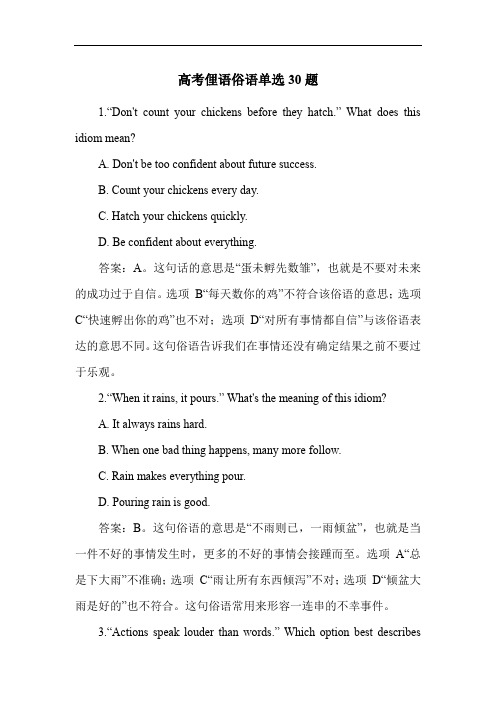
高考俚语俗语单选30题1.“Don't count your chickens before they hatch.” What does this idiom mean?A. Don't be too confident about future success.B. Count your chickens every day.C. Hatch your chickens quickly.D. Be confident about everything.答案:A。
这句话的意思是“蛋未孵先数雏”,也就是不要对未来的成功过于自信。
选项B“每天数你的鸡”不符合该俗语的意思;选项C“快速孵出你的鸡”也不对;选项D“对所有事情都自信”与该俗语表达的意思不同。
这句俗语告诉我们在事情还没有确定结果之前不要过于乐观。
2.“When it rains, it pours.” What's the meaning of this idiom?A. It always rains hard.B. When one bad thing happens, many more follow.C. Rain makes everything pour.D. Pouring rain is good.答案:B。
这句俗语的意思是“不雨则已,一雨倾盆”,也就是当一件不好的事情发生时,更多的不好的事情会接踵而至。
选项A“总是下大雨”不准确;选项C“雨让所有东西倾泻”不对;选项D“倾盆大雨是好的”也不符合。
这句俗语常用来形容一连串的不幸事件。
3.“Actions speak louder than words.” Which option best describesthis idiom?A. Words are more important than actions.B. Actions are more important than words.C. Both actions and words are equally important.D. Neither actions nor words are important.答案:B。
高考英语俚语与俗语练习题20题(带答案)
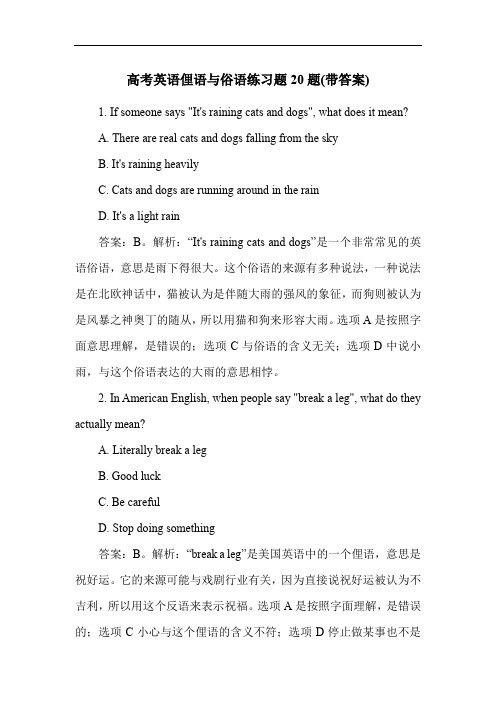
高考英语俚语与俗语练习题20题(带答案)1. If someone says "It's raining cats and dogs", what does it mean?A. There are real cats and dogs falling from the skyB. It's raining heavilyC. Cats and dogs are running around in the rainD. It's a light rain答案:B。
解析:“It's raining cats and dogs”是一个非常常见的英语俗语,意思是雨下得很大。
这个俗语的来源有多种说法,一种说法是在北欧神话中,猫被认为是伴随大雨的强风的象征,而狗则被认为是风暴之神奥丁的随从,所以用猫和狗来形容大雨。
选项A是按照字面意思理解,是错误的;选项C与俗语的含义无关;选项D中说小雨,与这个俗语表达的大雨的意思相悖。
2. In American English, when people say "break a leg", what do they actually mean?A. Literally break a legB. Good luckC. Be carefulD. Stop doing something答案:B。
解析:“break a leg”是美国英语中的一个俚语,意思是祝好运。
它的来源可能与戏剧行业有关,因为直接说祝好运被认为不吉利,所以用这个反语来表示祝福。
选项A是按照字面理解,是错误的;选项C小心与这个俚语的含义不符;选项D停止做某事也不是这个俚语的意思。
3. The phrase "cost an arm and a leg" means:A. It is very cheapB. It is very expensiveC. It has something to do with body partsD. It is free答案:B。
高考英语俚语与俗语单选题30题
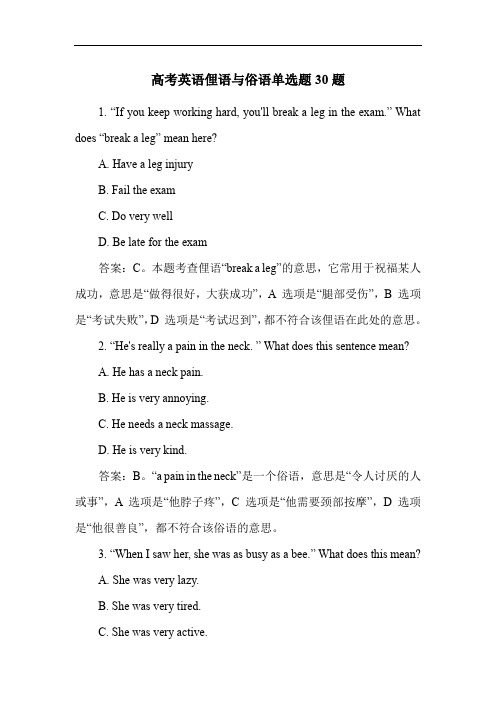
高考英语俚语与俗语单选题30题1. “If you keep working hard, you'll break a leg in the exam.” What does “break a leg” mean here?A. Have a leg injuryB. Fail the examC. Do very wellD. Be late for the exam答案:C。
本题考查俚语“break a leg”的意思,它常用于祝福某人成功,意思是“做得很好,大获成功”,A 选项是“腿部受伤”,B 选项是“考试失败”,D 选项是“考试迟到”,都不符合该俚语在此处的意思。
2. “He's really a pain in the neck. ” What does this sentence mean?A. He has a neck pain.B. He is very annoying.C. He needs a neck massage.D. He is very kind.答案:B。
“a pain in the neck”是一个俗语,意思是“令人讨厌的人或事”,A 选项是“他脖子疼”,C 选项是“他需要颈部按摩”,D 选项是“他很善良”,都不符合该俗语的意思。
3. “When I saw her, she was as busy as a bee.” What does this mean?A. She was very lazy.B. She was very tired.C. She was very active.D. She was very quiet.答案:C。
“as busy as a bee”意思是“非常忙碌,活跃”,A 选项“她很懒”,B 选项“她很累”,D 选项“她很安静”都不符合该短语的意思。
4. “It's raining cats and dogs outside.” What does this expression mean?A. There are many cats and dogs.B. It's raining very heavily.C. It's a sunny day.D. The rain is very light.答案:B。
高考俚语俗语单选30题

高考俚语俗语单选30题1.“Don't count your chickens before they hatch.” What does this idiom mean?A.Don't be too confident.B.Don't eat chicken eggs.C.Don't raise chickens.D.Don't buy chickens.答案:A。
这句话的意思是“蛋未孵先数雏”,引申为“不要过早乐观”,A 选项“不要太自信”意思最为接近。
B 选项是“不要吃鸡蛋”,C 选项是“不要养鸡”,D 选项是“不要买鸡”,均与该俚语的意思不符。
2.“Hit the books.” What does this idiom mean?A.Hit someone with a book.B.Study hard.C.Buy books.D.Read books for fun.答案:B。
“Hit the books”意为“努力学习”,B 选项正确。
A 选项是“用书打人”,C 选项是“买书”,D 选项是“为了娱乐而读书”,都不是这个俚语的正确意思。
3.“A piece of cake.” What does this idiom mean?A.A slice of cake.B.Very easy.C.Bake a cake.D.Eat cake.答案:B。
“A piece of cake”表示“很容易”,B 选项符合。
A 选项是“一片蛋糕”,C 选项是“烤蛋糕”,D 选项是“吃蛋糕”,都不是这个俚语的本意。
4.“Break a leg!” What does this idiom mean?A.Have a broken leg.B.Good luck.C.Run fast.D.Dance well.答案:B。
“Break a leg!”是一种祝福语,意为“祝你好运”,B 选项正确。
高考英语俚语与俗语单选题30题
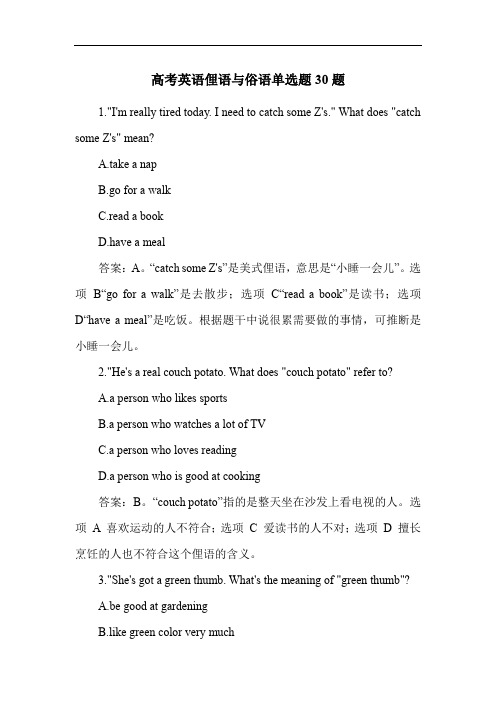
高考英语俚语与俗语单选题30题1."I'm really tired today. I need to catch some Z's." What does "catch some Z's" mean?A.take a napB.go for a walkC.read a bookD.have a meal答案:A。
“catch some Z's”是美式俚语,意思是“小睡一会儿”。
选项B“go for a walk”是去散步;选项C“read a book”是读书;选项D“have a meal”是吃饭。
根据题干中说很累需要做的事情,可推断是小睡一会儿。
2."He's a real couch potato. What does "couch potato" refer to?A.a person who likes sportsB.a person who watches a lot of TVC.a person who loves readingD.a person who is good at cooking答案:B。
“couch potato”指的是整天坐在沙发上看电视的人。
选项 A 喜欢运动的人不符合;选项C 爱读书的人不对;选项D 擅长烹饪的人也不符合这个俚语的含义。
3."She's got a green thumb. What's the meaning of "green thumb"?A.be good at gardeningB.like green color very muchC.have a lot of plantsD.be a professional gardener答案:A。
“green thumb”表示擅长园艺。
高中英语谚语练习题50题(带答案)
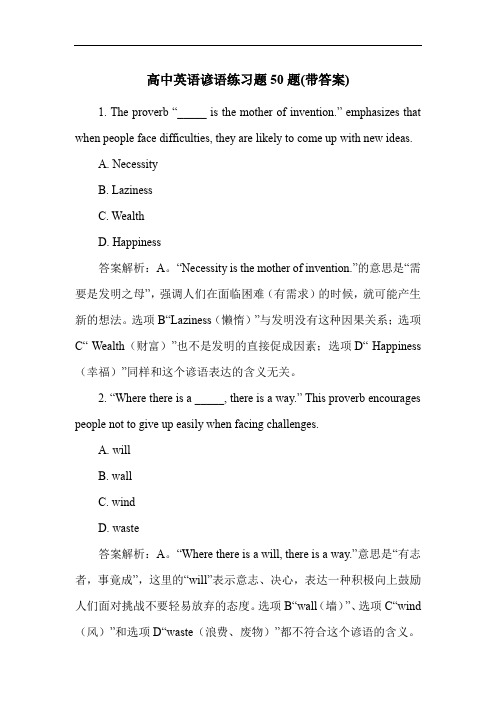
高中英语谚语练习题50题(带答案)1. The proverb “_____ is the mother of invention.” emphasizes that when people face difficulties, they are likely to come up with new ideas.A. NecessityB. LazinessC. WealthD. Happiness答案解析:A。
“Necessity is the mother of invention.”的意思是“需要是发明之母”,强调人们在面临困难( 有需求)的时候,就可能产生新的想法。
选项B“Laziness( 懒惰)”与发明没有这种因果关系;选项C“ Wealth 财富)”也不是发明的直接促成因素;选项D“ Happiness 幸福)”同样和这个谚语表达的含义无关。
2. “Where there is a _____, there is a way.” This proverb encourages people not to give up easily when facing challenges.A. willB. wallC. windD. waste答案解析:A。
“Where there is a will, there is a way.”意思是“有志者,事竟成”,这里的“will”表示意志、决心,表达一种积极向上鼓励人们面对挑战不要轻易放弃的态度。
选项B“wall( 墙)”、选项C“wind 风)”和选项D“waste 浪费、废物)”都不符合这个谚语的含义。
3. Which of the following completes the proverb “A friend in need isa _____ indeed.”?A. friendB. helperC. strangerD. enemy答案解析:A。
高中英语谚语单选题80题
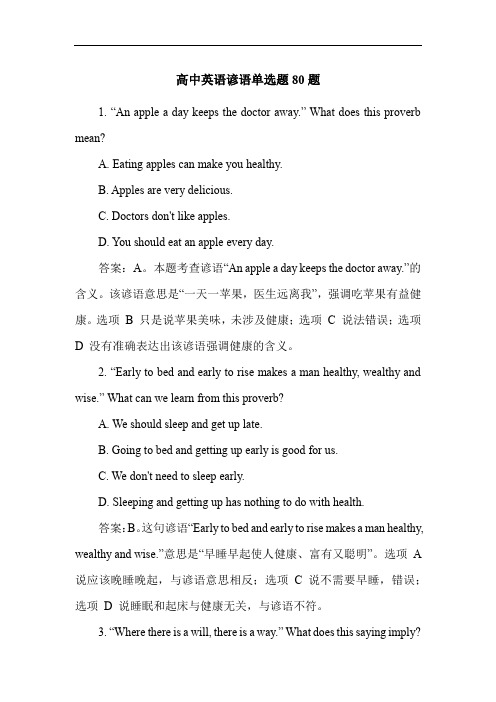
高中英语谚语单选题80题1. “An apple a day keeps the doctor away.” What does this proverb mean?A. Eating apples can make you healthy.B. Apples are very delicious.C. Doctors don't like apples.D. You should eat an apple every day.答案:A。
本题考查谚语“An apple a day keeps the doctor away.”的含义。
该谚语意思是“一天一苹果,医生远离我”,强调吃苹果有益健康。
选项B 只是说苹果美味,未涉及健康;选项C 说法错误;选项D 没有准确表达出该谚语强调健康的含义。
2. “Early to bed and early to rise makes a man healthy, wealthy and wise.” What can we learn from this proverb?A. We should sleep and get up late.B. Going to bed and getting up early is good for us.C. We don't need to sleep early.D. Sleeping and getting up has nothing to do with health.答案:B。
这句谚语“Early to bed and early to rise makes a man healthy, wealthy and wise.”意思是“早睡早起使人健康、富有又聪明”。
选项A 说应该晚睡晚起,与谚语意思相反;选项 C 说不需要早睡,错误;选项D 说睡眠和起床与健康无关,与谚语不符。
3. “Where there is a will, there is a way.” What does this saying imply?A. If you have a strong desire, you can find a solution.B. There is no way to succeed if you don't have a will.C. A strong will can lead to success.D. All of the above.答案:D。
汇总英语谚语练习40题
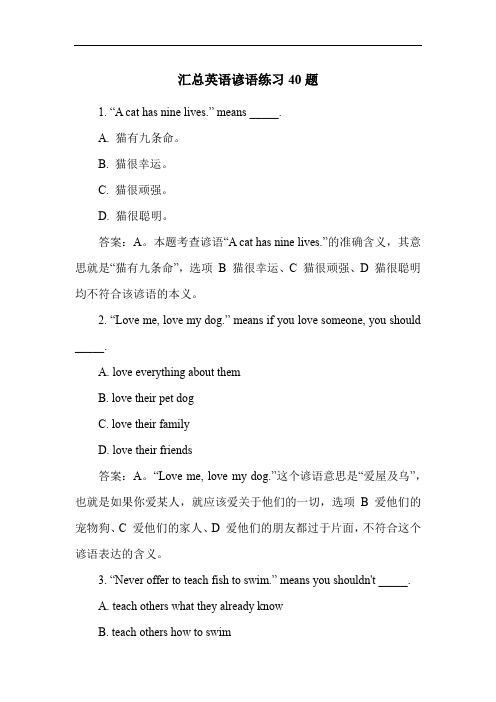
汇总英语谚语练习40题1. “A cat has nine lives.” means _____.A. 猫有九条命。
B. 猫很幸运。
C. 猫很顽强。
D. 猫很聪明。
答案:A。
本题考查谚语“A cat has nine lives.”的准确含义,其意思就是“猫有九条命”,选项B 猫很幸运、C 猫很顽强、D 猫很聪明均不符合该谚语的本义。
2. “Love me, love my dog.” means if you love someone, you should _____.A. love everything about themB. love their pet dogC. love their familyD. love their friends答案:A。
“Love me, love my dog.”这个谚语意思是“爱屋及乌”,也就是如果你爱某人,就应该爱关于他们的一切,选项B 爱他们的宠物狗、C 爱他们的家人、D 爱他们的朋友都过于片面,不符合这个谚语表达的含义。
3. “Never offer to teach fish to swim.” means you shouldn't _____.A. teach others what they already knowB. teach others how to swimC. offer to help othersD. offer to give fish to others答案:A。
“Never offer to teach fish to swim.”意思是“不要班门弄斧”,即不要教别人已经知道的东西,选项B 教别人如何游泳、C 主动帮助别人、D 主动给别人鱼都不符合该谚语的意思。
4. “When the cat's away, the mice will play.” means _____.A. mice like to play when the cat is awayB. people do what they want when there is no supervisionC. cats and mice can't play togetherD. cats don't like to play with mice答案:B。
高考俚语俗语单选30题答案解析版
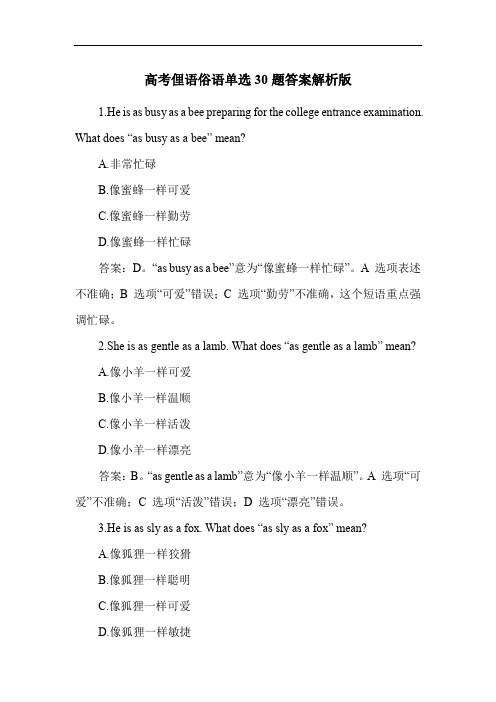
高考俚语俗语单选30题答案解析版1.He is as busy as a bee preparing for the college entrance examination. What does “as busy as a bee” mean?A.非常忙碌B.像蜜蜂一样可爱C.像蜜蜂一样勤劳D.像蜜蜂一样忙碌答案:D。
“as busy as a bee”意为“像蜜蜂一样忙碌”。
A 选项表述不准确;B 选项“可爱”错误;C 选项“勤劳”不准确,这个短语重点强调忙碌。
2.She is as gentle as a lamb. What does “as gentle as a lamb” mean?A.像小羊一样可爱B.像小羊一样温顺C.像小羊一样活泼D.像小羊一样漂亮答案:B。
“as gentle as a lamb”意为“像小羊一样温顺”。
A 选项“可爱”不准确;C 选项“活泼”错误;D 选项“漂亮”错误。
3.He is as sly as a fox. What does “as sly as a fox” mean?A.像狐狸一样狡猾B.像狐狸一样聪明C.像狐狸一样可爱D.像狐狸一样敏捷答案:A。
“as sly as a fox”意为“像狐狸一样狡猾”。
B 选项“聪明”不准确;C 选项“可爱”错误;D 选项“敏捷”错误。
4.She is as brave as a lion. What does “as brave as a lion” mean?A.像狮子一样强壮B.像狮子一样勇敢C.像狮子一样威风D.像狮子一样凶猛答案:B。
“as brave as a lion”意为“像狮子一样勇敢”。
A 选项“强壮”错误;C 选项“威风”不准确;D 选项“凶猛”错误。
5.He is as stubborn as a mule. What does “as stubborn as a mule” mean?A.像骡子一样强壮B.像骡子一样勤劳C.像骡子一样倔强D.像骡子一样可爱答案:C。
高中英语谚语练习题50题(答案解析)
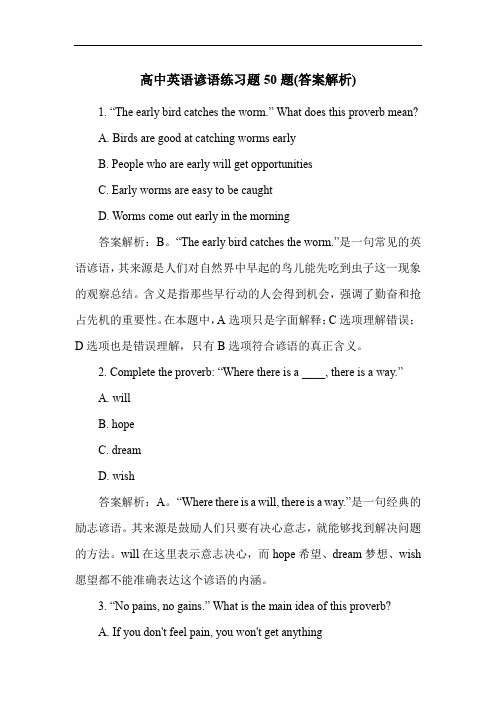
高中英语谚语练习题50题(答案解析)1. “The early bird catches the worm.” What does this proverb mean?A. Birds are good at catching worms earlyB. People who are early will get opportunitiesC. Early worms are easy to be caughtD. Worms come out early in the morning答案解析:B。
“The early bird catches the worm.”是一句常见的英语谚语,其来源是人们对自然界中早起的鸟儿能先吃到虫子这一现象的观察总结。
含义是指那些早行动的人会得到机会,强调了勤奋和抢占先机的重要性。
在本题中,A选项只是字面解释;C选项理解错误;D选项也是错误理解,只有B选项符合谚语的真正含义。
2. Complete the proverb: “Where there is a ____, there is a way.”A. willB. hopeC. dreamD. wish答案解析:A。
“Where there is a will, there is a way.”是一句经典的励志谚语。
其来源是鼓励人们只要有决心意志,就能够找到解决问题的方法。
will在这里表示意志决心,而hope希望、dream梦想、wish 愿望都不能准确表达这个谚语的内涵。
3. “No pains, no gains.” What is the main idea of this proverb?A. If you don't feel pain, you won't get anythingB. Without hard work, you won't achieve successC. Pain is necessary for getting thingsD. Gains always come with pains答案解析:B。
高考英语俚语与俗语运用单选题40题
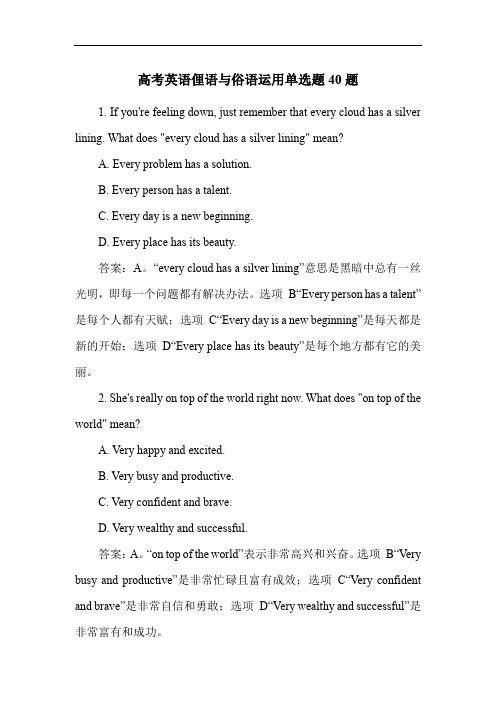
高考英语俚语与俗语运用单选题40题1. If you're feeling down, just remember that every cloud has a silver lining. What does "every cloud has a silver lining" mean?A. Every problem has a solution.B. Every person has a talent.C. Every day is a new beginning.D. Every place has its beauty.答案:A。
“every cloud has a silver lining”意思是黑暗中总有一丝光明,即每一个问题都有解决办法。
选项B“Every person has a talent”是每个人都有天赋;选项C“Every day is a new beginning”是每天都是新的开始;选项D“Every place has its beauty”是每个地方都有它的美丽。
2. She's really on top of the world right now. What does "on top of the world" mean?A. Very happy and excited.B. Very busy and productive.C. Very confident and brave.D. Very wealthy and successful.答案:A。
“on top of the world”表示非常高兴和兴奋。
选项B“Very busy and productive”是非常忙碌且富有成效;选项C“Very confident and brave”是非常自信和勇敢;选项D“Very wealthy and successful”是非常富有和成功。
高中英语谚语练习题50题(答案解析)
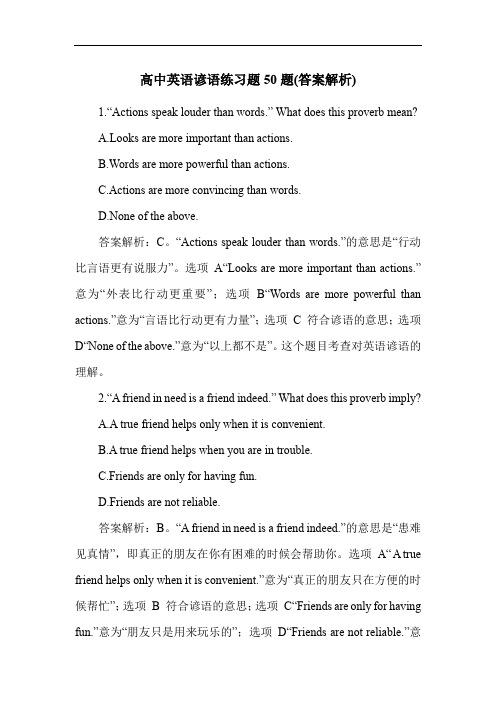
高中英语谚语练习题50题(答案解析)1.“Actions speak louder than words.” What does this proverb mean?A.Looks are more important than actions.B.Words are more powerful than actions.C.Actions are more convincing than words.D.None of the above.答案解析:C。
“Actions speak louder than words.”的意思是“行动比言语更有说服力”。
选项A“Looks are more important than actions.”意为“外表比行动更重要”;选项B“Words are more powerful than actions.”意为“言语比行动更有力量”;选项C 符合谚语的意思;选项D“None of the above.”意为“以上都不是”。
这个题目考查对英语谚语的理解。
2.“A friend in need is a friend indeed.” What does this proverb imply?A.A true friend helps only when it is convenient.B.A true friend helps when you are in trouble.C.Friends are only for having fun.D.Friends are not reliable.答案解析:B。
“A friend in need is a friend indeed.”的意思是“患难见真情”,即真正的朋友在你有困难的时候会帮助你。
选项A“ A true friend helps only when it is convenient.”意为“真正的朋友只在方便的时候帮忙”;选项B 符合谚语的意思;选项C“Friends are only for having fun.”意为“朋友只是用来玩乐的”;选项D“Friends are not reliable.”意为“朋友不可靠”。
高中英语英语俗语用法单选50题

高中英语英语俗语用法单选50题1. When my friend was in trouble, I told him, "Don't worry. Every cloud has a silver lining." What does this idiom mean?A. Every bad situation has a positive side.B. Clouds are always beautiful.C. Silver is very precious.D. Worrying never solves problems.答案:A。
解析:“Every cloud has a silver lining”这个习语意思是“每片乌云都有银边”,指每个糟糕的情况都有积极的一面。
选项B 说的是云的美丽,与习语含义无关;选项C 说的是银的珍贵,不是习语的意思;选项D 说的是担忧不能解决问题,与习语含义不符。
2. My sister always says, "A stitch in time saves nine." What does she mean?A. It's better to do something on time to prevent more problems.B. Stitching is an easy job.C. Nine stitches are needed to fix a problem.D. Saving is very important.答案:A。
解析:“A stitch in time saves nine”意思是“及时一针省九针”,意味着及时处理问题可以避免更多的麻烦。
选项B 说的是缝补容易,不符合习语含义;选项C 说的是需要九针来解决问题,理解错误;选项D 说的是节省重要,与习语无关。
3. My father told me, "Actions speak louder than words." What doesthis mean?A. What you do is more important than what you say.B. Speaking loudly is not good.C. Actions are always noisy.D. Words are more powerful than actions.答案:A。
高中英语英语俗语用法单选50题
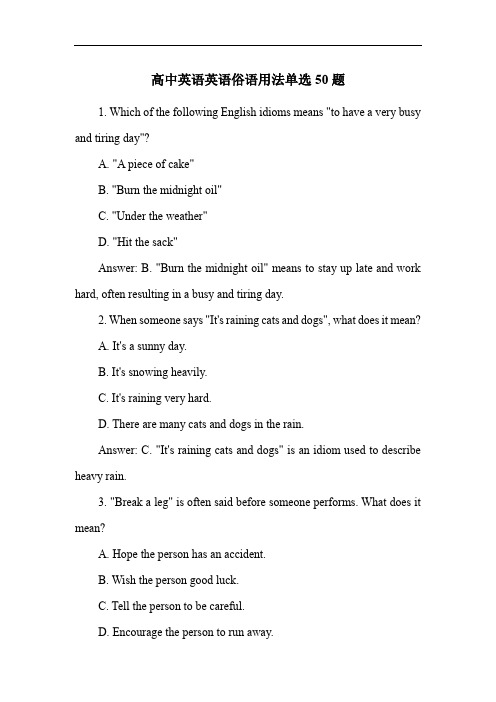
高中英语英语俗语用法单选50题1. Which of the following English idioms means "to have a very busy and tiring day"?A. "A piece of cake"B. "Burn the midnight oil"C. "Under the weather"D. "Hit the sack"Answer: B. "Burn the midnight oil" means to stay up late and work hard, often resulting in a busy and tiring day.2. When someone says "It's raining cats and dogs", what does it mean?A. It's a sunny day.B. It's snowing heavily.C. It's raining very hard.D. There are many cats and dogs in the rain.Answer: C. "It's raining cats and dogs" is an idiom used to describe heavy rain.3. "Break a leg" is often said before someone performs. What does it mean?A. Hope the person has an accident.B. Wish the person good luck.C. Tell the person to be careful.D. Encourage the person to run away.Answer: B. "Break a leg" is an idiomatic way of wishing someone good luck, especially before a performance.4. If you hear someone say "Bite the bullet", what do they mean?A. To have a delicious meal.B. To face a difficult situation bravely.C. To shoot someone with a bullet.D. To chew on a bullet.Answer: B. "Bite the bullet" means to accept or deal with a difficult or unpleasant situation with courage.5. What does the idiom "Cost an arm and a leg" mean?A. Something is very cheap.B. Something is very expensive.C. Something is easy to get.D. Something is not worth having.Answer: B. "Cost an arm and a leg" means that something requires a lot of money, indicating it is very expensive.6. "The early bird catches the worm." What does this idiom mean in the context of school life?A. It means arriving early at school gives you an advantage.B. It means studying hard leads to good grades.C. It means being active in class makes you popular.Answer: A. This idiom implies that those who act promptly or arriveearly have better chances or opportunities. In the context of school life, arriving early at school might give you more time to prepare for classes or access resources before others.7. "You can't judge a book by its cover." How can this idiom be applied to school?A. It means don't judge a student's intelligence by their appearance.B. It means don't choose a book based on its cover.C. It means don't judge a teacher by their looks.Answer: A. In a school setting, this idiom suggests that we shouldn't form opinions about a student's abilities, character, or potential just based on how they look or present themselves initially.8. "All work and no play makes Jack a dull boy." What does this idiom teach us in school?A. It tells us to balance study and rest.B. It tells us to focus only on study.C. It tells us to avoid playing.Answer: A. In the context of school, this idiom emphasizes the importance of having a balance between academic work and recreational activities. Spending all our time studying without having any fun or relaxation can make us less creative and less enjoyable to be around.9. "When in Rome, do as the Romans do." How can this idiom relate to school?A. It means follow the school rules.B. It means copy what other students do.C. It means respect the local customs of the school.Answer: A. When applied to school, this idiom implies that students should adhere to the established norms, behaviors, and rules of the school environment.10. "Two heads are better than one." How can this idiom be relevant in a school project?A. It means working alone is better.B. It means working in a group can lead to better results.C. It means having two leaders is ideal.Answer: B. In the context of a school project, this idiom indicates that collaborating and sharing ideas with others can often produce more successful outcomes than working independently.11. When you want to say that someone is very sociable and friendly at a party, you would say, "He/She is the life and ____ of the party."A. soulB. heartC. mindD. spiritAnswer: A. "The life and soul of the party" is a common English idiom meaning someone who is very lively and makes the party enjoyable.12. If you say "It's a small world" after meeting an old acquaintance unexpectedly at a social event, you mean ____.A. the world is getting smallerB. it's amazing to run into someone you knowC. there are not many people in the worldD. social events are always full of surprisesAnswer: B. "It's a small world" is used to express surprise when you encounter someone you know in an unlikely place or situation.13. "Break the ice" is often used when you want to ____ at a social gathering.A. start a conversationB. end a conversationC. change the topicD. avoid a topicAnswer: A. "Break the ice" means to start a conversation or do something to make people feel more comfortable and start interacting.14. When you hear "Mix and mingle" at a social function, it means you should ____.A. stay in one placeB. move around and talk to different peopleC. keep quietD. leave the placeAnswer: B. "Mix and mingle" encourages people to interact and talk with various individuals.15. "Social butterfly" is used to describe someone who ____.A. is shy at social eventsB. doesn't like social eventsC. is very active and enjoys social events a lotD. only attends important social eventsAnswer: C. "Social butterfly" refers to a person who is outgoing and frequently participates in and enjoys social activities.16. "The new employee is really hitting the ground running in our company. What does this idiom mean?A. Making a lot of mistakesB. Working very hard and effectively from the startC. Taking things slowlyD. Not being productiveAnswer: B. 'Hitting the ground running' means working very hard and effectively from the start.17. "John always goes the extra mile at work. What does this idiom imply?A. Does the minimum requiredB. Does more than is necessary or expectedC. Is often lateD. Avoids difficult tasksAnswer: B. 'Going the extra mile' means doing more than is necessary or expected.18. "The boss told us to think outside the box when solving this problem. What is the meaning of this idiom?A. To be creative and unconventionalB. To follow traditional methodsC. To stay within the rulesD. To ignore the problemAnswer: A. 'Thinking outside the box' means to be creative and unconventional.19. "We need to keep our noses to the grindstone to meet the deadline. What does this idiom suggest?A. To work hard and continuouslyB. To take frequent breaksC. To avoid workD. To complain about the workAnswer: A. 'Keeping our noses to the grindstone' means to work hard and continuously.20. "The project was a piece of cake for the experienced team. What does this idiom indicate?A. Very difficultB. Easy and straightforwardC. Long and complicatedD. UnfinishedAnswer: B. 'A piece of cake' means easy and straightforward.21. When we talk about a journey that was full of unexpected surprises, we might say, "It was a case of ________."A. the road less traveledB. a wild goose chaseC. a journey of a thousand miles begins with a single stepD. all roads lead to Rome ; Answer: B. "A wild goose chase" means a pursuit that is futile or wasteful, often involving a lot of running around with no useful result. In this context, it fits the description of a journey with unexpected and perhaps unproductive surprises.22. If someone says, "I'm going on a trip to broaden my horizons," what does it mean?A. To have a lot of funB. To learn new things and gain new perspectivesC. To meet new peopleD. To take a lot of pictures ; Answer: B. "To broaden one's horizons" means to expand one's knowledge, experiences, and perspectives.23. "The early bird catches the worm" is often used to encourage people to start their travels ________.A. as early as possibleB. with a lot of planningC. with a group of friendsD. by themselves ; Answer: A. The phrase means that those who act promptly or early have an advantage. In the context of travel, it suggests starting early to make the most of the journey.24. What does the saying "Take the scenic route" imply?A. Choose the fastest way to reach the destinationB. Enjoy the beautiful views along the wayC. Travel aloneD. Avoid crowded places ; Answer: B. "Take the scenic route" means to choose a path that offers beautiful or interesting sights rather than the quickest one.25. "A rolling stone gathers no moss" can be related to travel in the sense that:A. It's better to stay in one place during a tripB. One should keep moving and having new experiencesC. Travel is tiringD. One should travel with a lot of luggage ; Answer: B. The phrase implies that a person who is constantly moving and changing does not accumulate unnecessary attachments or stagnation. In the context of travel, it suggests the value of continuous exploration and new experiences.26. Which of the following idioms means "a very talented person in the field of literature"?A. A dark horseB. A man of lettersC. Break the iceD. Hit the nail on the headAnswer: B. "A man of letters" refers to a person who is highly accomplished in literature.27. "To have a green thumb" is an idiom often used in the context of art. What does it mean?A. To be good at gardeningB. To be creative in paintingC. To have a talent for musicD. To be skilled in writingAnswer: A. "To have a green thumb" means to be good at gardening.28. Which idiom means "to express something very clearly and effectively"?A. Paint the town redB. Spill the beansC. Cry wolfD. Put one's cards on the tableAnswer: D. "Put one's cards on the table" means to express something openly and honestly.29. What does the idiom "The pen is mightier than the sword" imply?A. Writing is more powerful than fightingB. Art is less important than warC. Swords are stronger than pensD. Writing has no effect Answer: A. It implies that the power of writing and communication is stronger than physical force or violence.30. "To be in the limelight" is an idiom related to art. What does it mean?A. To be unnoticedB. To be the center of attentionC. To be in a dark placeD. To be hidden from viewAnswer: B. "To be in the limelight" means to be the focus of public attention.31. "You can't teach an old dog new tricks" is often used to mean that it's difficult to change someone's habits. Which of the following situations does this idiom fit?A. A young athlete learning a new sport quickly.B. An elderly person refusing to try a new exercise routine.C. A child mastering a difficult gymnastic move.D. A coach inventing a new training method.Answer: B. This idiom is typically used to describe the resistance of an older person to adopt new ways or habits, as in the case of an elderly person refusing to try a new exercise routine.32. "Hit the ground running" is an idiom related to sports. What does it mean in the context of a sports competition?A. To start slowly and build up speed gradually.B. To start strongly and be immediately successful.C. To trip and fall at the beginning of the race.D. To stop and rest before the competition starts.Answer: B. "Hit the ground running" means to start something with a lot of energy and be immediately effective or successful, which is applicable to starting a sports competition strongly.33. When we say "jump the gun" in a sports context, it implies:A. Starting before the official signal.B. Making a high jump easily.C. Shooting accurately in a shooting competition.D. Crossing the finish line first.Answer: A. "Jump the gun" means to start too soon, before the proper or expected time, such as starting before the official signal in a sports event.34. "Keep your eye on the ball" is a common sports idiom. What advice does it give?A. Stay focused and pay attention.B. Look around and enjoy the scenery.C. Close your eyes and relax.D. Ignore distractions and keep playing.Answer: A. "Keep your eye on the ball" means to stay concentrated and pay close attention to the main thing or task at hand, especially in a sports situation.35. "Pull out all the stops" in a sports team's performance means:A. Use all available resources and efforts to succeed.B. Stop trying hard and give up.C. Take frequent breaks during the game.D. Hide one's true abilities.Answer: A. "Pull out all the stops" implies making the maximum effort and using every possible means or resource to achieve success, like in a sports team's performance.36. "The new technology is like a double-edged sword. " In this sentence, the phrase "a double-edged sword" means:A. Something that has only positive effectsB. Something that has both positive and negative effectsC. Something that has only negative effectsD. Something that has no effect at allAnswer: B. "A double-edged sword" means something that has both positive and negative effects. Technology can bring convenience and progress, but it can also cause problems such as privacy concerns and environmental pollution.37. "We are in the digital age, and everything is changing at the speed of light." What does "at the speed of light" mean in this context?A. Very slowlyB. Moderately fastC. Extremely fastD. Not at allAnswer: C. "At the speed of light" means extremely fast. In the digitalage, technological advancements and changes are happening very rapidly.38. "The development of artificial intelligence is a game-changer in the field of technology." What does "a game-changer" mean?A. Something that has no impactB. Something that makes a significant differenceC. Something that is easy to predictD. Something that is difficult to understandAnswer: B. "A game-changer" means something that makes a significant difference. The development of artificial intelligence has brought about major transformations in the technology sector.39. "With the advent of 5G technology, our lives will be revolutionized." What does "the advent of" mean?A. The end ofB. The beginning ofC. The middle ofD. The improvement ofAnswer: B. "The advent of" means the beginning of. 5G technology is a new beginning that will bring significant changes to our lives.40. "Technology is a Pandora's box; once opened, it's hard to control." What does "Pandora's box" mean?A. Something full of hopeB. Something full of surprisesC. Something that brings only good thingsD. Something that causes many problems when openedAnswer: D. "Pandora's box" refers to something that causes many problems when opened. Technology, while offering many benefits, also presents various challenges and issues that are difficult to manage.41. “The early bird catches the worm” is often used to encourage people to act promptly. But which of the following environmental proverbs has a similar meaning?A. “A stitch in time saves nine.”B. “Don't throw the baby out with the bathwater.”C. “When the going gets tough, the tough get going.”D. “One man's meat is another man's poison.”Answer: A. “A stitch in time saves nine” means taking action in time to prevent a problem from getting worse, similar to “The early bird catches the worm” in the sense of prompt action.42. Which of the following proverbs is related to the importance of conserving natural resources?A. “Make hay while the sun shines.”B. “Rome wasn't built in a day.”C. “Every cloud has a silver lining.”D. “A tree is known by its fruit.”Answer: A. “Make hay while the sun shines” implies making the mostof an opportunity, which can be applied to using natural resources efficiently while they are available.43. “You can't make an omelette without breaking eggs” is a common saying. In the context of environmental protection, what does it suggest?A. Some sacrifices are necessary for progress.B. We should avoid all risks.C. Every problem has a solution.D. Actions speak louder than words.Answer: A. In environmental protection, it means that achieving certain goals might involve some negative impacts initially, but they could lead to overall benefits in the long run.44. What does the proverb “The best laid plans of mice and men often go awry” imply in terms of environmental conservation efforts?A. We should be flexible in our conservation plans.B. All conservation plans will fail.C. Planning is not important in conservation.D. We should not make any plans for conservation.Answer: A. It suggests that even well-thought-out plans for environmental conservation might face unexpected challenges, so we need to be adaptable.45. “A bird in the hand is worth two in the bush” is a well-known saying. How can it be related to environmental decisions?A. It means we should always choose the option with more benefits.B. We should value what we have rather than chasing uncertain gains.C. We should take risks for greater environmental benefits.D. It has no relation to environmental decisions.Answer: B. In environmental decisions, it implies that we should prioritize protecting and conserving the existing natural resources we have instead of risking their loss for potential but uncertain greater benefits.46. "A stitch in time saves nine" is often used to emphasize the importance of dealing with a problem promptly. Which of the following situations best illustrates this idiom?A. Tom fixed the leak in the roof as soon as he noticed it, preventing more damage.B. Mary waited until the last minute to study for the exam and failed.C. John ignored the small scratch on his car and it turned into a big rust spot.D. Lisa bought a new dress even though she had many at home.Answer: A. This situation shows that by taking action early (fixing the leak promptly), Tom saved himself from more extensive damage, which aligns with the meaning of the idiom that timely action can prevent greater problems.47. The idiom "History repeats itself" suggests that events and patterns tend to recur over time. Which of the following examples supportsthis idiom?A. New technologies always solve all the problems of the past.B. Wars have different causes and outcomes each time.C. Economic crises often have similar causes and effects throughout history.D. Cultural trends change completely and never resemble those of the past.Answer: C. Economic crises having similar causes and effects over time indicates that history repeats itself in this aspect.48. "Those who do not learn from history are doomed to repeat it" implies that we should study the past to avoid making the same mistakes. Which of the following scenarios shows a failure to learn from history?A. A country implements new environmental policies based on past successful models.B. A company adopts a new marketing strategy without researching past failures.C. A student studies historical battles to understand military tactics.D. A city improves its infrastructure based on lessons from previous disasters.Answer: B. The company not researching past failures and potentially making the same mistakes shows a failure to learn from history.49. The idiom "The pen is mightier than the sword" emphasizes thepower of words and ideas. In which situation is this idiom most applicable?A. A military general leading an army to victory.B. A writer influencing public opinion through a powerful article.C. A blacksmith creating sharp swords.D. A athlete winning a championship.Answer: B. A writer influencing public opinion through a powerful article demonstrates the power of words and ideas, aligning with the meaning of the idiom.50. "Rome wasn't built in a day" means that great achievements take time and effort. Which of the following examples best represents this idiom?A. A student mastering a difficult subject overnight.B. A construction project being completed quickly with many workers.C. An artist spending years perfecting a masterpiece.D. A team winning a championship in their first season.Answer: C. An artist spending years perfecting a masterpiece shows that significant accomplishments require considerable time and dedication, consistent with the meaning of the idiom.。
高考英语常考英文谚语集锦及练习
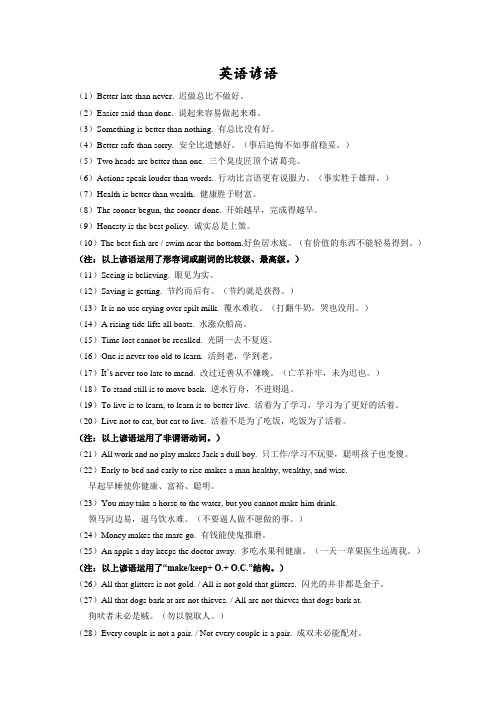
英语谚语(1)Better late than never. 迟做总比不做好。
(2)Easier said than done. 说起来容易做起来难。
(3)Something is better than nothing. 有总比没有好。
(4)Better safe than sorry. 安全比遗憾好。
(事后追悔不如事前稳妥。
)(5)Two heads are better than one. 三个臭皮匠顶个诸葛亮。
(6)Actions speak louder than words. 行动比言语更有说服力。
(事实胜于雄辩。
)(7)Health is better than wealth. 健康胜于财富。
(8)The sooner begun, the sooner done. 开始越早,完成得越早。
(9)Honesty is the best policy. 诚实总是上策。
(10)The best fish are / swim near the bottom.好鱼居水底。
(有价值的东西不能轻易得到。
)(注:以上谚语运用了形容词或副词的比较级、最高级。
)(11)Seeing is believing. 眼见为实。
(12)Saving is getting. 节约而后有。
(节约就是获得。
)(13)It is no use crying over spilt milk. 覆水难收。
(打翻牛奶,哭也没用。
)(14)A rising tide lifts all boats. 水涨众船高。
(15)Time lost cannot be recalled. 光阴一去不复返。
(16)One is never too old to learn. 活到老,学到老。
(17)It’s never too late to mend. 改过迁善从不嫌晚。
(亡羊补牢,未为迟也。
)(18)To stand still is to move back. 逆水行舟,不进则退。
- 1、下载文档前请自行甄别文档内容的完整性,平台不提供额外的编辑、内容补充、找答案等附加服务。
- 2、"仅部分预览"的文档,不可在线预览部分如存在完整性等问题,可反馈申请退款(可完整预览的文档不适用该条件!)。
- 3、如文档侵犯您的权益,请联系客服反馈,我们会尽快为您处理(人工客服工作时间:9:00-18:30)。
2015高考英语常考英文谚语集锦及练习英语谚语是洋溢着异国文化气息的哲理性语言,是智慧的结晶。
近年的高考英语试题中的谚语的出现频率越来越高,它通常与情景交际题、阅读理解等题型结合,用来提供情景或点明观点主旨。
在英语作文中适当引用一些谚语或名言,往往也会起到画龙点睛的作用,为文章增光添彩。
(1)Better late than never. 迟做总比不做好。
(2)Easier said than done. 说起来容易做起来难。
(3)Something is better than nothing. 有总比没有好。
(4)Better safe than sorry. 安全比遗憾好。
(事后追悔不如事前稳妥。
)(5)Two heads are better than one. 三个臭皮匠顶个诸葛亮。
(6)Actions speak louder than words. 行动比言语更有说服力。
(事实胜于雄辩。
)(7)Health is better than wealth. 健康胜于财富。
(8)The sooner begun, the sooner done. 开始越早,完成得越早。
(9)Honesty is the best policy. 诚实总是上策。
(10)The best fish are / swim near the bottom.好鱼居水底。
(有价值的东西不能轻易得到。
)(注:以上谚语运用了形容词或副词的比较级、最高级。
)(11)Seeing is believing. 眼见为实。
(12)Saving is getting. 节约而后有。
(节约就是获得。
)(13)It is no use crying over spilt milk. 覆水难收。
(打翻牛奶,哭也没用。
)(14)A rising tide lifts all boats. 水涨众船高。
(15)Time lost cannot be recalled. 光阴一去不复返。
(16)One is never too old to learn. 活到老,学到老。
(17)It’s never too late to mend. 改过迁善从不嫌晚。
(亡羊补牢,未为迟也。
)(18)To stand still is to move back. 逆水行舟,不进则退。
(19)To live is to learn, to learn is to better live. 活着为了学习,学习为了更好的活着。
(20)Live not to eat, but eat to live. 活着不是为了吃饭,吃饭为了活着。
(注:以上谚语运用了非谓语动词。
)(21)All work and no play makes Jack a dull boy. 只工作/学习不玩耍,聪明孩子也变傻。
(22)Early to bed and early to rise makes a man healthy, wealthy, and wise.早起早睡使你健康、富裕、聪明。
(23)You may take a horse to the water, but you cannot make him drink.领马河边易,逼马饮水难。
(不要逼人做不愿做的事。
)(24)Money makes the mare go. 有钱能使鬼推磨。
(25)An apple a day keeps the doctor away. 多吃水果利健康。
(一天一苹果医生远离我。
)(注:以上谚语运用了“make/keep+ O.+ O.C.”结构。
)(26)All that glitters is not gold. / All is not gold that glitters. 闪光的并非都是金子。
(27)All that dogs bark at are not thieves. / All are not thieves that dogs bark at.狗吠者未必是贼。
(勿以貌取人。
)(28)Every couple is not a pair. / Not every couple is a pair. 成双未必能配对。
(注:以上谚语运用了部分否定结构。
)(29)It is the early bird that catches the worm. 早出的鸟儿吃到虫。
(疾足者先得。
)(30)It’s a long lane that has no turning.否极泰来。
路必有弯,事必有变。
(没有弯曲的路真长。
)/(不顺是暂时,转机定出现。
)(31)It is love that makes the world go round. 爱使世界更美好。
(32)It is a good horse that never stumbles, and a good wife that never grumbles.良马会失蹄,贤妻有牢骚。
(注:以上谚语运用了强调句型。
)(33)Never put off till tomorrow. 今日事,今日做。
(今日事,今日毕。
)(34)An eye for an eye, a tooth for a tooth. 以眼还眼,以牙还牙。
(35)A fall into the pit, a gain in your wit.吃一堑,长一智。
(36)Once bitten, twice shy. 一朝被蛇咬,十年怕井绳。
(一次上当,下次小心。
)(37)Out of sight, out of mind. 眼不见,心不想。
(不见就忘。
)/(离久情疏。
)(38)Waste not, want not. 不浪费,不愁缺。
(39)No pains, no gains. 不劳无获。
(40)More hasty, less speed. 欲速则不达。
(41)Like father, like son.有其父,必有其子。
(42)Well begun, half done. 好的开始等于成功的一半。
(43)An idle youth, a needy age. 少壮不努力,老大徒伤悲。
(44)The older, the wiser. 姜是老的辣。
(45)As the tree, so the fruit. 种瓜得瓜,种豆得豆。
(46)The sooner, the better. 越快越好。
(47)First come, first served. 先到者先受用。
(先到先得。
)(48)Nothing brave, nothing have. 不入虎穴,焉得虎子。
(49)So said, so done. 说到做到,言出必行。
(50)Easy come, easy go. 来也匆匆,去也匆匆。
(注:以上谚语运用了“省略”结构。
)(51)He laughs best who laughs last. 谁笑在最后,谁笑得最好。
(52)All’s well that ends well. 结果好就是一切好。
(53)God helps those who help themselves. 天助自助者。
(54)Those who live in glass houses should not throw stones.家居玻璃房,切忌乱扔石。
(自己有弱点,勿揭他人短。
)(55)He that corrects not small faults will not control great ones. 小错不纠,大错难控。
(注:以上谚语运用了定语从句。
)(56)When in Rome do as the Romans do. 入境问俗。
(入乡随俗。
)(57)Strike while the iron is hot. 趁热打铁。
(58)Where there’s a will, there’s a way. 有志者事竟成。
(59)Where there’s smoke, there’s fire. 无风不起浪。
(60)Where there is life, there is hope. 有生命就有希望。
(留得青山在,不怕没柴烧。
)(61)If at first you don’t succeed, try, try, try again. 再接再厉,终会成功。
(62)If a thing is worth doing, it’s worth doing well. 凡值得一做的都值得做好。
(63)Don’t trouble trouble until trouble troubles you. 不要自找麻烦。
(64)Look before you leap. 三思而后行。
(65)Don’t count your chickens before they are hatched.小鸡孵出前,先别忙点数。
(办事尚未果,不把成功言。
)/(不要过早乐观。
)(66)East or west, home is the best. 金窝银窝不如自家草窝。
(注:以上谚语运用了状语从句。
)(67)A friend in need is a friend indeed. 患难见真情。
(68)No news is good news. 没有消息就是好消息。
(69)A bird in the hand is worth two in the bush. 双鸟在林不如一鸟在手。
(70)An hour in the morning is worth two in the evening. 一日之计在于晨。
(71)It never rains but it pours. 不雨则已,一雨倾盆。
(祸不单行。
)(72)Reading is to the mind what exercise is to the body.阅读对于我们心灵之重要,犹如运动对于身体一样。
(注:以上谚语运用了对称结构。
)(73)Practice makes perfect. 熟能生巧。
(74)Many hands make light work. 众人搭柴火焰高。
(75)Every minute counts. 分秒必争。
(76)Time and tide wait for no man.. 岁月不待人。
(77)A good beginning makes a good ending. 善始才有善终。
(78)All roads lead to Rome. 条条道路通罗马。
(79)Rome was not built in a day. 罗马不是一天建成的。
(冰冻三尺,非一日之寒。
